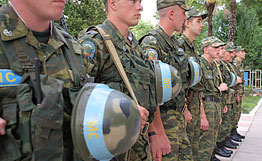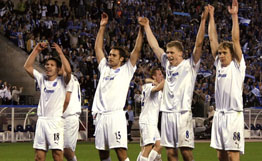english.pravda.ru
Sociologists consider that the number of Ukrainians who want to see their country in NATO has drastically decreased. Moreover, it happened after the Bucharest summit which the orange revolutionaries put high hopes on. Ukrainians proved to be cleverer than their government. What happened?
On April 24 a Ukrainian social service announced sensational changes in Ukrainians’ preferences in foreign policy. The number of Ukrainians who backed up the country’s entry into NATO dropped ten percent within the past four months. This statement was issued by Ilko Kucheriv, the Democratic Initiatives Fund Director, who presented the results of research conducted by the Ukrainian Sociology Service by order of the fund within the period from March 17 to 31.
“We were shocked by the results. We suddenly discovered that the number of Ukrainians who supported the country’s entry into NATO decreased ten percent,” bewildered Kucheriv said. Indeed, in March public support for Ukraine’s entry into NATO accounted for 21.8 percent, but last December it accounted for 32 percent, the Democratic Initiatives Fund suggested. It is enough to upset those who tried to persuade the world of Ukraine’s long-standing aspirations to join NATO.
The director of the Fund could not but attempt to explain the reasons for it. According to Kucheriv, population support for joining NATO lessened as soon as Ukraine’s striving for the NATO Membership Action Plan (MAP) was actively discussed at the Bucharest summit and after the letter of three leaders had been signed to claim Ukraine’s entry into the MAP.
On the whole, the public opinion poll suggested that about 59.6 percent are against Ukraine’s entry into the alliance, and 18.6 percent gave no answer. According to Kucheriv, NATO membership is mostly supported by inhabitants of Western Ukraine and Kiev. The Democratic Initiatives Fund director did not give further details and mentioned only the western part of the country and the capital, but his estimation does not arouse suspicion.
The attitude of Kievans is more pro-Western; it differed significantly from that of inhabitants from neighbouring regions and even from the Kievan region. To all appearances, there is provincial aspiration to feel like an inhabitant of a European capital, which is possible only with the help of external force. As to Western Ukraine, there are no questions at all. Over many years it was the only region where pros and cons of joining NATO were positively balanced.
So was it a sensation? There are several assumptions, but there is no sensation in any case. Until spring of 1999 there were quite a number of Ukrainian citizens (about 40-60 percent) who did not take a determined attitude to Ukraine’s entry into NATO. There are various reasons for this, but there is no need to mention them right now.
NATO’s aggression towards Yugoslavia caused unease. The Orange Revolution that has a clear geopolitical aspect made some ‘hesitating’ people to make up their mind. As a result, this situation did not change for three-four years. About 50 percent of adults (over 50 percent as a rule) are against Ukraine’s entry into NATO, about 15-25 percent are for the entry (about 30 percent said “more likely yes, than no”).
Probably, the announced sensation is the result of erroneous methods of research. The known Ukrainian inequality from the viewpoint of world outlook causes serious mistakes with insignificant sampling. Two thousand respondents (a standard choice in most public opinion polls in Ukraine) are not enough to obtain trustworthy results. In fact, most public opinion polls in the country evidence this.
The data yielded the Democratic Initiatives research can also serve as evidence. Thus, if there were a Sunday referendum over Ukraine’s EU membership, most Ukrainians (56 percent) would vote for the entry, the fund suggested. Twenty five percent would be against the country’s entry into the EU, 19 percent did not decide yet. The results are quite plausible and they coincide with the results presented three years ago.
However, wonders never cease with a dynamic. Thus, Kucheriv marked that there is a negative dynamic of public opinion in comparison with December of 2007 when 64 percent would vote for Ukraine’s entry into the EU, but there is a positive dynamic in comparison with 2005 when 47 percent were ready to vote for Ukraine’s entry into the EU. It is likely to be the result of insignificant sampling (2000 respondents) or some erroneous method of research.
However, there is another version. Ilko Kucheriv complained that this change in Ukrainians’ attitude to NATO is rather irrelevant – when the USA and New Europe urged Ukraine to join the MAP. It is not to be ruled out that if Ukraine had joined the MAP at the Bucharest summit, some public services would have changed the public poll results later. The same was done with the “rising dynamic.” But it did not happen, that is why they released plausible results.
“I cannot suspect rigging anyway. Maybe, my presumptions are wrong and undoubtedly offensive for honest sociologists. The topic of NATO is unpopular in Ukraine and all Ukrainian politicians know that. So does Yulia Timoshenko who struggles against Viktor Yushchenko, tries to gain Western support and to preserve her popularity in Ukraine. This causes such unexpected statements like NATO membership is “still up in the air”, that “the question will take a decade” or “it will be clear after the referendum”, etc.
However, while the letter of three leaders was first sent secretly, now public discussion of the MAP membership was inevitable. People awoke and understood that they may be ignored when taking serious decisions, which the orange government had already attempted to do. As a result, hesitating people come to their senses and had their say. There might be a grain of sense in these discussions.
If we have a look at the results revealed by the Democratic Initiatives Fund director, we will see that 32 percent of Ukrainians wanted to join NATO at the end of last year, but by late March ten percent of them changed their mind. How can we account for such indecision? Research methods must be wrong…
In any case, it should be noted that the results did not meet expectations of Atlantic (both overseas and local) integrators, that Russia’s clear-cut position will urge on Ukraine to join NATO. Yushchenko was right to say that “Ukrainians are not dumber than Bulgarians or Romanians.” However, he comes to discrepant conclusions. Ukrainians are much cleverer than Kiev, Washington and Brussels think. Unlike its government.




